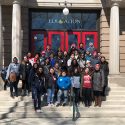UW–Madison scholar will use Marshall Scholarship to further voting rights research
Phoenix Rice-Johnson is proud of where she comes from, yet she realized when she got to college that her family had very little money relative to many of her peers.
It was an awakening of sorts. She came to view her blue-collar background as an asset, one she could draw upon in her scholarship and activism. It gave her a perspective, she says, that is sometimes missing from public policy discussions.
“It’s so important to have working-class people in decision-making spaces,” she says. “It’s why I’m inspired to do what I do. That voice needs to be heard.”
Rice-Johnson’s voice will be amplified, as she is one of 43 outstanding students from across the country chosen for a prestigious 2018 Marshall Scholarship. Winners were announced today. The scholarships give high-achieving young Americans the opportunity to study at any university in the United Kingdom.
Eligibility is open to college seniors and recent graduates. Rice-Johnson, of Pahoa, Hawaii, earned a bachelor’s degree from UW–Madison in 2016 in political science and international studies with comprehensive honors.
UW–Madison had a second student vying for a Marshall Scholarship this year. Senior Ross Dahlke, a journalism and political science major from Westfield, Wisconsin, was a finalist.
Rice-Johnson plans to use her scholarship to pursue a master’s degree in public policy from King’s College London. She intends to study best practices in the United Kingdom for running elections, engaging marginalized voters, and combating voter ID laws. She then plans to bring that knowledge back to the U.S. to increase voter turnout, especially among people of color and low-income people, she says.
“Ultimately, I believe that if we are going to create policy that helps communities like the one I grew up in, we need politicians, advocates, and researchers who can draw on their lived experiences to craft targeted solutions,” she wrote in her scholarship application. “A master’s degree in public policy is the next step in allowing me to advance that goal.”
Rice-Johnson describes her father as a hard-working mechanic and carpenter who would come home exhausted from a long day of work yet still find the energy to read her to sleep. For a while, the family lived without electricity or water while her father began building a home for them, she says.
She always loved learning and saw school as her ticket forward, she says. “I was that kid who always spent a lot of time at the library.”
She dreamed of going to college. Summer trips to visit her grandparents in northwestern Wisconsin put UW–Madison on her radar. At her graduation from the Hawaii Academy of Arts and Sciences, she beamed knowing she was one of three students attending a university on the “mainland.”
At UW–Madison, she sought civic involvement, something that had made her feel powerful in high school. She had been class president from eighth grade on and served on the School Board as an appointed student representative.
She became heavily involved in College Democrats of UW–Madison, serving in multiple capacities and rising to president of College Democrats of Wisconsin, winning a contested election. She helped run political campaigns and interned at the White House.
Through grassroots political experiences, she learned how easy it is for some voters to become disenfranchised, she says. One of her driving passions became assuring access to the ballot box. For her college senior honors thesis, she looked at gerrymandering and the ways politicians divide minority communities into electoral districts to dilute the power of their vote.
“Her evolution as a writer and thinker was as dramatic as it was impressive,” says English professor Russ Castronovo. “She exhibited the determination that will make her successful in any endeavor from graduate school to a life of public service.”
“Some people are detached from those they seek to help, but for me, these policies have an impact on the people I care about.”
Phoenix Rice-Johnson
Rice-Johnson was the recipient of many of UW–Madison’s top institutional awards, including the College of Letters and Science Dean’s Prize and the Teddy Kubly Award, an annual campus-wide honor for the most outstanding graduating senior. She was one of two UW–Madison students selected to receive a distinguished 2015 Truman Scholarship, awarded to 58 students nationwide.
Since graduation, she has worked as a research and program associate at the Brennan Center for Justice, a nonpartisan law and policy institute at the New York University School of Law. Her work focuses on breaking down barriers that keep marginalized people from voting.
“Some people are detached from those they seek to help, but for me, these policies have an impact on the people I care about,” Rice-Johnson says. “Many members of working-class communities work long hours or multiple jobs, which can make it difficult for them to get time off to vote. It’s not abstract to me.”
She plans to begin her master’s degree at King’s College London next fall.
“I can’t overstate my admiration for Phoenix, who is a true scholar-activist,” says Julie Stubbs, UW–Madison’s director of undergraduate academic awards. “She’s chosen to study pressing social problems and fight for change through advocacy work and the political process. While building an exceptional record of leadership at UW–Madison and beyond, she’s always found time to mentor and create opportunities for her more junior colleagues.”
UW–Madison’s last Marshall Scholars were Deshawn McKinney (class of 2017) and Andrew Bulovsky (class of 2014).
Tags: scholarship, student awards, voting




